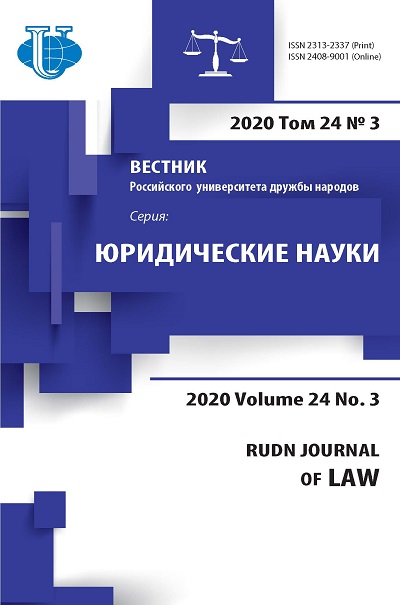NEUROMARKETING AND FREE WILL IN CIVIL LAW
- Authors: Likhter P.L.1
-
Affiliations:
- Penza State University
- Issue: Vol 24, No 3 (2020)
- Pages: 658-672
- Section: LAW AND DIGITAL TECHNOLOGIES
- URL: https://journals.rudn.ru/law/article/view/24566
- DOI: https://doi.org/10.22363/2313-2337-2020-24-3-658-672
- ID: 24566
Cite item
Full Text
Abstract
The research is devoted to topical issues of law in the field of neuromarketing. The transition from commodity economy to economy of impressions is largely due to application of modern methods of monitoring brain functioning in order to increase efficiency of production and trading strategies. Due to the potential ability to influence the decision-making process of clients, neuromarketing attracts mixed opinions from lawyers and psychologists. The current legislation does not provide an appropriate level of regulation of neuroscience and their results in the market. At the same time, the precontractual impact on the consumer may contain signs of distorting the principles of freedom of contract, good faith, and reasonableness. The article proposes to consider the rational behavior of an individual - one of the main presumptions of civil law - from a new perspective, given the current results of neuropsychological research and ethical and legal aspects of social relations. The results of the work allow to speak about fundamental possibility of limiting the dynamic form of free will in a contractual obligation (up to the refusal of a transaction) if there are conditions related both directly to the psychophysiological characteristics of the counterparty and the pe-culiarities of neuromarketing effects under a specific contract. The relevance of hierarchical concepts of autonomy of will is noted; these are the situations when an individual choice is subject to legal protection, if it reflects a genuine will, consistent with the essential goals and values of the person. The absence of defects in awareness and voluntariness in such cases is a key aspect of principles of freedom of contract and reasonableness associated with a conscious decision when entering an obligation.
About the authors
Pavel L. Likhter
Penza State University
Author for correspondence.
Email: lixter@mail.ru
Candidate of Legal Sciences, associate professor the Department of Public and Private Law
40 Krasnaya str., 440026, Penza, Russian FederationReferences
- Dworkin, G. (1988) The Theory and Practice of Autonomy. Cambridge: Cambridge University Press.
- Em, V.S. (2004) Osushchestvlenie i zashchita grazhdanskih prav [The exercise and protection of civil rights] // Grazhdanskoe pravo: Uchebnik / Pod red. Suhanova E.A. Moscow: Volters Kluver Publ., Vol. 1. (in Russian).
- Golevinskii, V.I. (1872) O proiskhozhdenii i delenii obyazatel'stv [On the origin and division of obligations]. Varshava: Tip. O. Bergera. (in Russian).
- Krasavchikov, O.A. (1966) Vozmeshchenie vreda, prichinennogo istochnikom povyshennoj opasnosti [Compensation for damage caused by a source of increased danger]. Moscow: Yuridicheskaya literature Publ. (in Russian).
- Libet, B. (1985) Unconscious cerebral initiative and the role of conscious will in voluntary action. The Behavioral and Brain Sciences. 8 (4). 529–566.
- Lindstrom, M. (2012) Brandwashed: Tricks Companies Use to Manipulate Our Minds and Persuade Us to Buy. L.: Kogan Page.
- Mandzhiev, A.D. (2017) Svoboda voli v dogovornyh pravootnosheniyah [Free will in contractual relations]. Moscow: Statut Publ. (in Russian).
- Markensis, S.B., Unberath, H., Johnston, A. (2006) The German Law of Contract. A Comparative Treatise. Oxford; Portland; Oregon.
- Morin, C. (2011) Neuromarketing: the new science of consumer behavior. Society. 2011. 48 (2). 131–135.
- Pokrovskii, I.A. (2013) Osnovnye problemy grazhdanskogo prava [The main problems of civil law]. Moscow: Statut Publ. (in Russian).
- Pominov, D. (2019) Chuvstvennyj banking [Sensual Banking]. Bankovskoe obozrenie. 2019. 3 (242). 44–47. (in Russian).
- Savost'yanova, O.N. (2017) Sdelki pod vliyaniem sushchestvennogo zabluzhdeniya (stat'ya 178 Grazhdanskogo kodeksa Rossiiskoi Federacii): analiz sudebnoi praktiki posle vneseniya popravok v ukazannuyu stat'yu Federal'nym zakonom ot 7 maya 2013 g. № 100-FZ [Transactions influenced by material misconception (Article 178 of the Civil Code of the Russian Federation): analysis of judicial practice after amendments to this article by Federal Law of May 7, 2013 No. 100-ФЗ]. Yurist. 14. 31–35. (in Russian).
- Smith, K. (2011) Neuroscience vs philosophy: Taking aim at free will. Nature. 477 (7362). 23–50.
- Soon, C., Brass, M., Heinze, H., John-Dylan (2008) Unconscious determinants of free decisions in the human brain. Nature Neuroscience. 11 (5). 543–545.
- Tuzhilova-Ordanskaya, E.M., Luk'yanenko, V.E. (2019) Konvalidaciya nedejstvitel'nyh sdelok v rossiiskom prave [Validation of invalid transactions in Russian law]. Vestnik Permskogo universiteta. Yuridicheskie nauki [Bulletin of Perm University. Jurisprudence.] 3. 519– 539. (in Russian).
- Vanin, V.V., Tihonov, V.V. (2019) To the question of the concept of "reasonable actions" in the civil law of Russia. Civil law. 2. 26–28. (in Russian).
- Vaypan, V.A. (2018) The principle of justice in civil law and judicial discretion. Civil law. 1. 22– 28. (in Russian).
- Wilson, T.D., Dunn, E.W. (2004) Self-Knowledge: Its Limits, Value, and Potential for Improvement. Annual Review of Psychology. № 55 (1). 493–518.
Supplementary files















